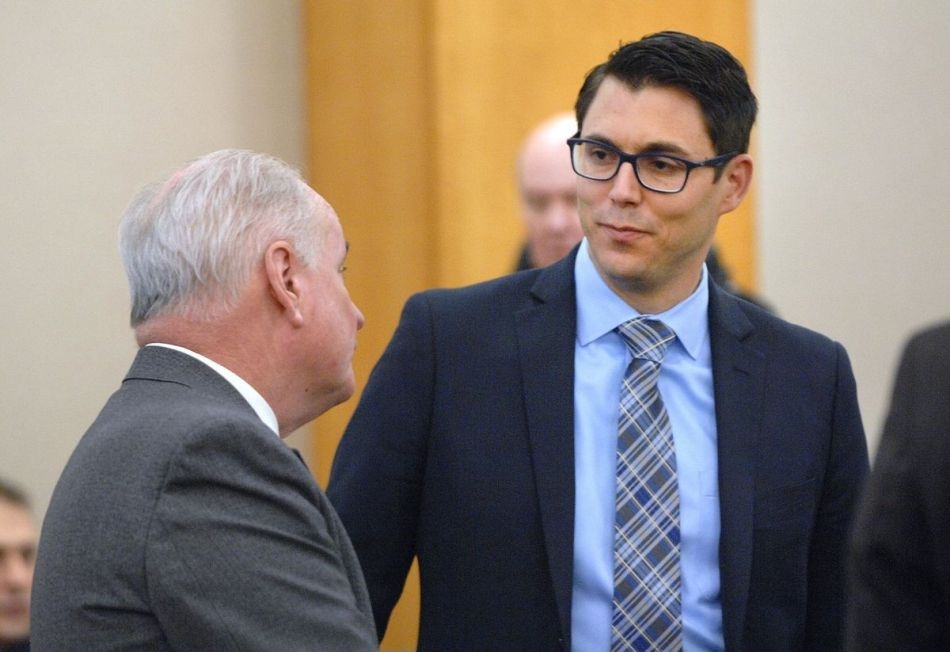Dec 15 2016
Rivian Automotive isn't just ready for the auto market to change. It's counting on it.
 RJ Scaringe, Rivian Automotive CEO, talks to State Rep. Dan Brady, R-Bloomington, before addressing the Normal Town Council Monday evening. David Proeber, the Pantagraph
RJ Scaringe, Rivian Automotive CEO, talks to State Rep. Dan Brady, R-Bloomington, before addressing the Normal Town Council Monday evening. David Proeber, the Pantagraph
"Our second set of vehicles ... is designed for pure mobility-as-a-service. You press a button on your phone, and a vehicle shows up. Of course, the vehicle is driving itself, and of course you don't own the vehicle. You're paying for that service on a variable basis," CEO RJ Scaringe said on Tuesday.
"That's something we see happening in the post-2020 environment. ... We've designed our organization to facilitate a lot of that transformation."
The Normal City Council approved a $1 million grant Monday and became the first taxing body to approve a five-year property tax abatement — both based on performance — for the automaker that plans to buy the vacant Mitsubishi Motors North America plant, which ended production a year ago, and make electric cars there, employing 1,000 workers and investing $175 million in the site through 2024.
Driver-operated passenger vehicles would be just the beginning.
Rivian, Scaringe said, wants to make cars that can succeed both in the current market and in a future dominated by a ride-hailing model such as that promoted by Uber and Lyft.
"If I didn't tell you that asset was a vehicle, you would ... say, 'Why do I want to purchase this thing that I never use that loses 65 percent of its value (within five years) and takes a ton of money to keep operational?" Scaringe said. "Our purpose and our vision is to design a company that helps us transition from the world of very low utilization to a world of increasing levels."
The company has research locations in the Detroit and San Francisco areas with about 100 employees. It was founded in Florida in 2009, but left that state to get closer to its suppliers after satisfying the terms of a $2 million state grant, he said.
Scaringe previously acknowledged that the company has operated in secret in the past, but will be much more transparent going forward.
The first step, Scaringe said, is a line of electric cars "that fit between five and seven passengers" and "have a very high level of utility combined with a very high level of performance," as well as "a very high level of efficiency."
Normal City Manager Mark Peterson, who has driven the prototype, said, "It made me feel better that that's a real car and it's very impressive."
The company plans to unveil its first mass-produced vehicle in the next 12 to 15 months, Scaringe told The Pantagraph.
"Those are designed to exist in a world where there's still an ownership-centric customer experience," he said. "But the vehicles are also designed to enable people to share ... either through fractionalized ownership or subscription."
Scaringe referred to the car as "sports-car quick, but a vehicle your whole family can fit into."
Rivian must now tailor the former Normal auto plant to those needs, Scaringe said. Despite the car's technological advancements, he affirmed there will be opportunities for former Mitsubishi employees to work at the plant.
"The body shop is going to be changing quite significantly. The stamping operation will continue to run as it did. ... The general assembly line will be used as is with modifications," he said. "It sounds like a long time, 'three years before we see significant hiring ramp-up,' but it's really not."
Scaringe thinks the vehicle can be successful in Bloomington-Normal and beyond — starting with Rivian employees.
"We hope people who build these vehicles are also able to purchase these vehicles," he said. "We hope to see many of these vehicles on the road here."